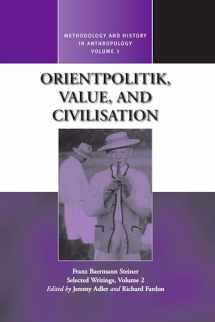
Orientpolitik, Value, and Civilization (Methodology & History in Anthropology, 3)
Book details
Summary
Description
This is the first collection of Franz Steiner's keynote papers on comparative economics and the classification of labor,complemented by major unpublished texts on politics, civilization, and cultural criticism. This enables a complete re-evaluation of Steiner's thought. His ideas on truth, value, and civilization are highly critical of Western culture and offer perhaps the earliest critique of Orientalism in British anthropology. Equally significant is the inclusion of Steiner's unpublished lectures on Aristotle and Simmel, the latter probably being the first lecture series devoted to Simmel's ideas by a British-based anthropologist, as well as hitherto unedited political writings.
Another side to Steiner's thought is shown by his aphorisms, often caustic texts and newly translated from the German, as well as by verse translations of his poems relevant to his scholarship. These include an extract from his autobiographical poem, "Conquest", that places his anthropological writings into a personal and ultimately religious framework.A detailed introduction, based on new research, provides a thorough study of Steiner's ideas and establishes the wider intellectual context, thus rounding off a most remarkable collection of texts by one of the most remarkable anthropologists of this century.


We would LOVE it if you could help us and other readers by reviewing the book
Book review



